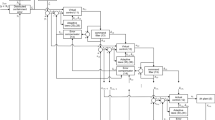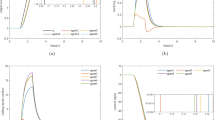Abstract
A distributed actuator fault-tolerant strategy for fuzzy multi-agent systems is investigated in this paper. The proposed strategy utilizes an adaptive methodology in designing the consensus control. Compared with well-known consensus analysis, this paper devotes to the fault effect in analyzing multi-agent consensus problem. We conducted a Lyapunov stability analysis to unfold the advantages of proposed method in the distributed fault-tolerant control. Simulation example is provided to demonstrate the effectiveness of the theoretical results.





Similar content being viewed by others
References
A. Abdurahman, H. Jiang, Z. Teng, Finite-time synchronization for fuzzy cellular neural networks with time-varying delays. Fuzzy Sets Syst. 297, 96–111 (2016)
S. Chen, D.W.C. Ho, L. Li, M. Liu, Fault-tolerant consensus of multi-agent system with distributed adaptive protocol. IEEE Trans. Cybern. 45(10), 2142–2155 (2016)
S. Chen, D.W.C. Ho, Sampled-data approach to state estimation performance for heterogeneous distributed system with fault. Asian J. Control 17(6), 1–11 (2015)
Z. Gao, T. Breikin, H. Wang, High-gain estimator and fault-tolerant design with application to a gas turbine dynamic system. IEEE Trans. Control Syst. Technol. 15(4), 740–753 (2007)
H. Gao, T. Chen, Stabilization of nonlinear systems under variable sampling: a fuzzy control approach. IEEE Trans. Fuzzy Syst. 15(5), 972–983 (2007)
R.A. Horn, C.R. Johnson, Matrix analysis (Cambridge University Press, Cambridge, 1985)
M. Hu, J. Cao, A. Hu, Y. Yang, Y. Jin, A novel finite-time stability criterion for linear discrete-time stochastic system with applications to consensus of multi-agent system. Circuits Syst. Signal Process. 34(1), 41–59 (2015)
C. Huang, D. Ho, J. Lu, J. Kurths, Pinning synchronization in T-S fuzzy complex networks with partial and discrete-time couplings. IEEE Trans. Fuzzy Syst. 23(4), 1274–1285 (2015)
P.A. Ioannou, J. Sun, Robust adaptive control (PTR Prentice-Hall, Upper Saddle River, 1996)
A. Jadbabaie, J. Lin, A. Morse, Coordination of groups of mobile autonomous agents using nearest neighbor rules. IEEE Trans. Autom. Control 48(6), 988–1001 (2003)
R. Jia, Finite-time stability of a class of fuzzy cellular neural networks with multi-proportional delays. Fuzzy Sets Syst. 319, 70–80 (2017)
B. Jiang, M. Staroswiecki, V. Cocquempot, Fault accommodation for nonlinear dynamic systems. IEEE Trans. Autom. Control 51(9), 1578–1583 (2006)
L. Li, D.W.C. Ho, J. Lu, A unified approach to practical consensus with quantized data and time delay. IEEE Trans. Circuits Syst. I Regul. Pap. 60(10), 2668–2678 (2013)
Y. Li, Impulsive synchronization of stochastic neural networks via controlling partial states. Neural Process. Lett. 46(1), 59–69 (2017)
M. Liu, D.W.C. Ho, P. Shi, Adaptive fault-tolerant compensation control for Markovian jump systems with mismatched external disturbance. Automatica 58, 5–14 (2015)
J. Lu, C. Ding, J. Lou, J. Cao, Outer synchronization of partially coupled dynamical networks via pinning impulsive controllers. J. Franklin Inst. 352(11), 5024–5041 (2015)
J. Lu, Z. Wang, J. Cao, D.W.C. Ho, Pinning impulsive stabilization of nonlinear dynamical networks with time-varying delay. Int. J. Bifurcat. Chaos 22, 1250176 (2012)
R. Olfati-Saber, R. Murray, Consensus problems in networks of agents with switching topology and time-delays. IEEE Trans. Autom. Control 49(9), 1520–1533 (2004)
W. Ren, R.W. Beard, Consensus seeking in multiagent systems under dynamically changing interaction topologies. IEEE Trans. Autom. Control 50(5), 655–661 (2005)
Q. Shen, B. Jiang, V. Cocquempot, Adaptive fault-tolerant backstepping control against actuator gain faults and its applications to an aircraft longitudinal motion dynamics. Int. J. Robust Nonlinear Control 23(15), 1753–1779 (2013)
Q. Song, F. Liu, J. Cao, W. Yu, M-matrix strategies for pinning-controlled leader-following consensus in multiagent systems with nonlinear dynamics. IEEE Trans. Cybern. 43(6), 1688–1697 (2013)
X. Su, L. Wu, P. Shi, Sensor networks with random link failures: distributed filtering for T–S fuzzy systems. IEEE Trans. Industr. Inf. 9(3), 1739–1750 (2013)
M. Wang, B. Chen, X. Liu, P. Shi, Adaptive fuzzy tracking control for a class of perturbed strict-feedback nonlinear time-delay systems. Fuzzy Sets Syst. 159(8), 949–967 (2008)
G. Wen, Z. Duan, G. Chen, W. Yu, Consensus tracking of multi-agent systems with lipschitz-type node dynamics and switching topologies. IEEE Trans. Circuits Syst. I Regul. Pap. 61(2), 499–511 (2014)
G. Wen, Y. Zhao, Z. Duan, W. Yu, G. Chen, Containment of higher-order multi-leader multi-agent systems: a dynamic output approach. IEEE Trans. Autom. Control 61(4), 1135–1140 (2016)
Y. Wu, R. Lu, Event-based control for network systems via integral quadratic constraints. IEEE Trans. Circuits Syst. I Regul. Pap. 65(4), 1386–1394 (2018)
L. Wu, D.W.C. Ho, Fuzzy filter design for ito stochastic systems with application to sensor fault detection. IEEE Trans. Fuzzy Syst. 17(1), 233–242 (2009)
Y. Wu, R. Lu, Output synchronization and L2-gain analysis for network systems. IEEE Trans. Syst. Man Cybern. Syst. (2017). https://doi.org/10.1109/TSMC.2017.2754544
H. Wang, Z. Wang, Y.-J. Liu, S. Tong, Fuzzy tracking adaptive control of discrete-time switched nonlinear systems. Fuzzy Sets Syst. 316, 35–48 (2017)
W. Xiong, D.W.C. Ho, Z. Wang, Consensus analysis of multiagent networks via aggregated and pinning approaches. IEEE Trans. Neural Netw. 22(8), 1231–1240 (2011)
W. Xiong, W. Yu, J. Lu, X. Yu, Fuzzy modelling and consensus of nonlinear multiagent systems with variable structure. IEEE Trans. Circuits Syst. I Regul. Pap. 61(4), 1183–1191 (2014)
W. Yu, G. Chen, M. Cao, Some necessary and sufficient conditions for second-order consensus in multi-agent dynamical systems. Automatica 46(6), 1089–1095 (2010)
W. Yu, L. Zhou, X. Yu, J. Lu, R. Lu, Consensus in multi-agent systems with second-order dynamics and sampled data. IEEE Trans. Industr. Inf. 9(4), 2137–2146 (2013)
D. Zhao, M. Chi, Z.-H. Guan, Y. Wu, J. Chen, Distributed estimator-based fault detection for multi-agent networks. Circuits Syst. Signal Process. 37(1), 98–111 (2018)
Q. Zhou, C. Wu, P. Shi, Observer-based adaptive fuzzy tracking control of nonlinear systems with time delay and input saturation. Fuzzy Sets Syst. 316, 49–68 (2017)
Z. Zuo, D.W.C. Ho, Y. Wang, Fault tolerant control for singular systems with actuator saturation and nonlinear perturbation. Automatica 46(3), 569–576 (2010)
Acknowledgements
This work was supported by National Natural Science Foundation of China under Grant 11626108 and 61673351, the Fundamental Research Funds for the Central Universities (2662015QD051). We gratefully acknowledge the support of NVIDIA Corporation with the donation of the Titan X Pascal GPU used for this research.
Author information
Authors and Affiliations
Corresponding author
Rights and permissions
About this article
Cite this article
Chen, S., Chen, B. & Shi, F. Distributed Fault-Tolerant Consensus Protocol for Fuzzy Multi-Agent Systems. Circuits Syst Signal Process 38, 611–624 (2019). https://doi.org/10.1007/s00034-018-0872-y
Received:
Revised:
Accepted:
Published:
Issue Date:
DOI: https://doi.org/10.1007/s00034-018-0872-y




